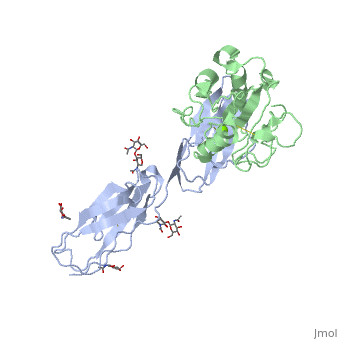Intercellular adhesion molecule: Difference between revisions
Jump to navigation
Jump to search
Michal Harel (talk | contribs) No edit summary |
Michal Harel (talk | contribs) No edit summary |
||
| (2 intermediate revisions by the same user not shown) | |||
| Line 6: | Line 6: | ||
*'''ICAM-1''' is Ig-like cell adhesion molecule which has a role in inflammatory processes and in T-cell mediated host defines system. | *'''ICAM-1''' is Ig-like cell adhesion molecule which has a role in inflammatory processes and in T-cell mediated host defines system. | ||
*'''ICAM-2''' mediates adhesive interactions important for antigen-specific immune response. | |||
*'''ICAM-3''' acts as recognition receptor in the phagocytosis of macrophages in engulfment of apoptotic neutrophils<ref>PMID:23775590</ref>. | |||
*'''ICAM-5''' has 2 types of binding activities: binding between neutrons and binding between neuron and leukocytes. | |||
== Disease == | == Disease == | ||
Latest revision as of 10:44, 4 July 2024
FunctionIntercellular adhesion molecule (ICAM) is part of the immunoglobulin superfamily. ICAM binds to leukocyte function associated molecule 1 (LFA-1) and macrophage-1 antigen during inflammation[1]. ICAM contains 5 Ig-like domains.
DiseaseICAM mutation is involved in multiple sclerosis[3].
|
| ||||||||||
3D structures of intercellular adhesion molecule3D structures of intercellular adhesion molecule
Updated on 04-July-2024
ReferencesReferences
- ↑ van de Stolpe A, van der Saag PT. Intercellular adhesion molecule-1. J Mol Med (Berl). 1996 Jan;74(1):13-33. PMID:8834767
- ↑ Kristóf E, Zahuczky G, Katona K, Doró Z, Nagy É, Fésüs L. Novel role of ICAM3 and LFA-1 in the clearance of apoptotic neutrophils by human macrophages. Apoptosis. 2013 Oct;18(10):1235-51. PMID:23775590 doi:10.1007/s10495-013-0873-z
- ↑ Nejentsev S, Laaksonen M, Tienari PJ, Fernandez O, Cordell H, Ruutiainen J, Wikstrom J, Pastinen T, Kuokkanen S, Hillert J, Ilonen J. Intercellular adhesion molecule-1 K469E polymorphism: study of association with multiple sclerosis. Hum Immunol. 2003 Mar;64(3):345-9. PMID:12590979
